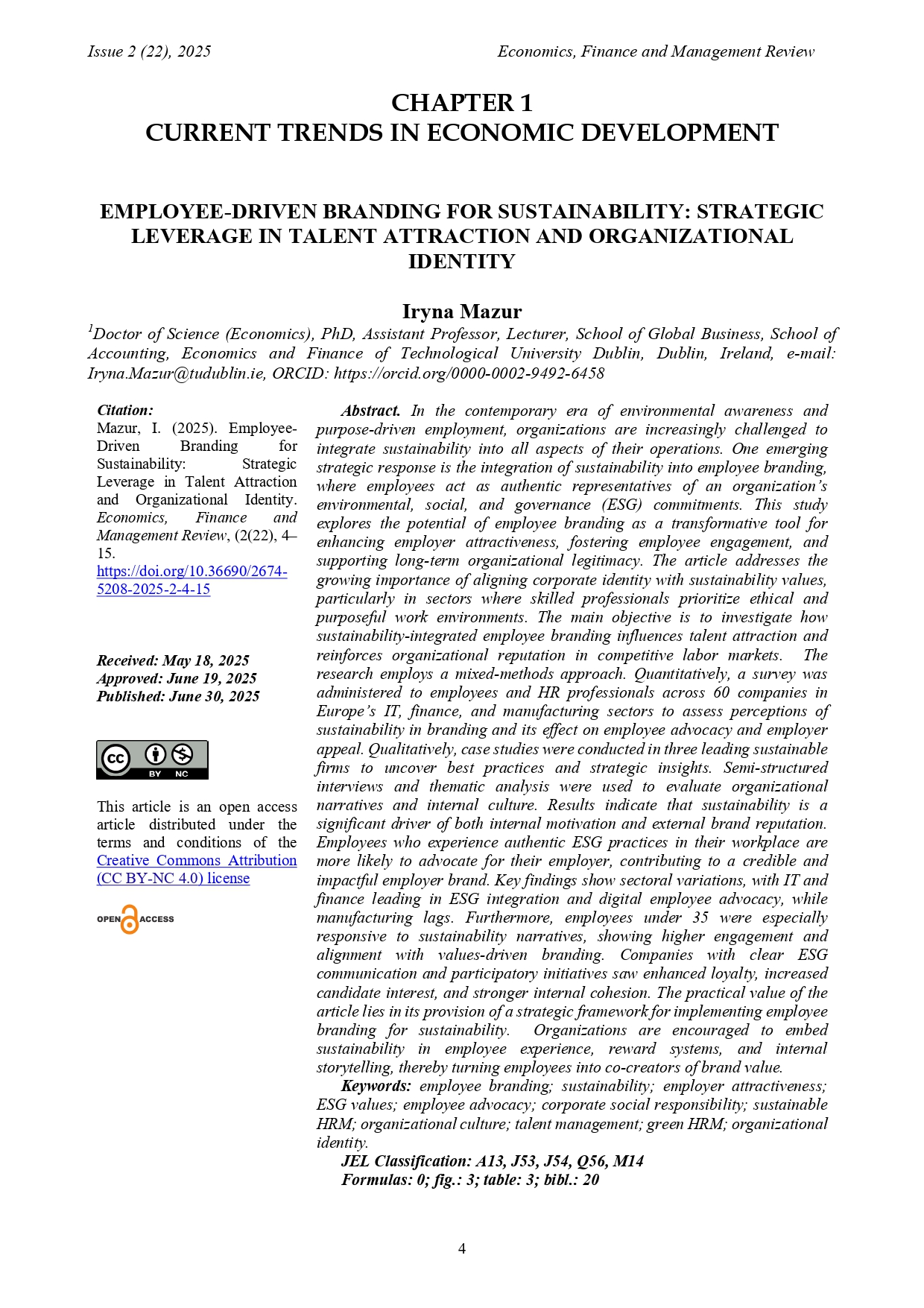EMPLOYEE-DRIVEN BRANDING FOR SUSTAINABILITY: STRATEGIC LEVERAGE IN TALENT ATTRACTION AND ORGANIZATIONAL IDENTITY
DOI:
https://doi.org/10.36690/2674-5208-2025-2-4-15Keywords:
employee branding, sustainability, employer attractiveness, ESG values, employee advocacy, corporate social responsibility, sustainable HRM, organizational culture, talent management, green HRM, organizational identityAbstract
In the contemporary era of environmental awareness and purpose-driven employment, organizations are increasingly challenged to integrate sustainability into all aspects of their operations. One emerging strategic response is the integration of sustainability into employee branding, where employees act as authentic representatives of an organization’s environmental, social, and governance (ESG) commitments. This study explores the potential of employee branding as a transformative tool for enhancing employer attractiveness, fostering employee engagement, and supporting long-term organizational legitimacy. The article addresses the growing importance of aligning corporate identity with sustainability values, particularly in sectors where skilled professionals prioritize ethical and purposeful work environments. The main objective is to investigate how sustainability-integrated employee branding influences talent attraction and reinforces organizational reputation in competitive labor markets. The research employs a mixed-methods approach. Quantitatively, a survey was administered to employees and HR professionals across 60 companies in Europe’s IT, finance, and manufacturing sectors to assess perceptions of sustainability in branding and its effect on employee advocacy and employer appeal. Qualitatively, case studies were conducted in three leading sustainable firms to uncover best practices and strategic insights. Semi-structured interviews and thematic analysis were used to evaluate organizational narratives and internal culture. Results indicate that sustainability is a significant driver of both internal motivation and external brand reputation. Employees who experience authentic ESG practices in their workplace are more likely to advocate for their employer, contributing to a credible and impactful employer brand. Key findings show sectoral variations, with IT and finance leading in ESG integration and digital employee advocacy, while manufacturing lags. Furthermore, employees under 35 were especially responsive to sustainability narratives, showing higher engagement and alignment with values-driven branding. Companies with clear ESG communication and participatory initiatives saw enhanced loyalty, increased candidate interest, and stronger internal cohesion. The practical value of the article lies in its provision of a strategic framework for implementing employee branding for sustainability. Organizations are encouraged to embed sustainability in employee experience, reward systems, and internal storytelling, thereby turning employees into co-creators of brand value.
Downloads
References
Albitar, K., Hussainey, K., Kolade, N., and Gerged, A. M. (2020). ESG disclosure and firm performance before and after IR: the moderating role of governance mechanisms. Int. J. Account. and Inf. Manag. 28 (3), 429–444. doi:10.1108/ijaim-09-2019-0108
Ambler, T., & Barrow, S. (1996). The employer brand. Journal of Brand Management, 4(3), 185–206. https://doi.org/10.1057/bm.1996.42
Backhaus, K., & Tikoo, S. (2004). Conceptualizing and researching employer branding. Career Development International, 9(5), 501–517. https://doi.org/10.1108/13620430410550754
Brammer, S., Millington, A., & Rayton, B. (2007). The contribution of corporate social responsibility to organizational commitment. International Journal of Human Resource Management, 18(10), 1701–1719. https://doi.org/10.1080/09585190701570866
Delmas, M. A., & Burbano, V. C. (2011). The drivers of greenwashing. California Management Review, 54(1), 64–87. https://doi.org/10.1525/cmr.2011.54.1.64
Deloitte. (2023). 2023 Gen Z and Millennial Survey. https://www2.deloitte.com/global/en/pages/about-deloitte/articles/genzmillennialsurvey.html
Ehnert, I., Parsa, S., Roper, I., Wagner, M., & Müller-Camen, M. (2016). Reporting on sustainability and HRM: A comparative study of sustainability reporting practices by the world's largest companies. International Journal of Human Resource Management, 27(1), 88–108. https://doi.org/10.1080/09585192.2015.1024157
Espinosa-Méndez, C., Maquieira, C. P., and Arias, J. T. (2023). The impact of ESG performance on the value of family firms: the moderating role of financial constraints and agency problems. Sustainability 15 (7), 6176. doi:10.3390/su15076176
Glavas, A. and Piderit, S.K. (2009) How Does Doing Good Matter? Effects of Corporate Citizenship on Employees. Journal of Corporate Citizenship, 2009, 51-70. http://dx.doi.org/10.9774/GLEAF.4700.2009.wi.00007
Guerci, M., Longoni, A., & Luzzini, D. (2015). Translating stakeholder pressures into environmental performance – The mediating role of green HRM practices. International Journal of Human Resource Management, 27(2), 262–289. https://doi.org/10.1080/09585192.2015.1065431
Huang, B., and Qiu, X. (2023). The impact of ESG ratings on employee performance in companies. Acad. J. Manag. Soc. Sci. 3 (2), 89–92. doi:10.54097/ajmss.v3i2.10255
Junius, D., Adisurjo, A., Rijanto, Y. A., and Adelina, Y. E. (2020). The impact of ESG performance to firm performance and market value. J. Apl. Akunt. 5 (1), 21–41. doi:10.29303/jaa.v5i1.84
Kimpakorn, N., & Tocquer, G. (2009). Employees’ commitment to brands in the service sector: Luxury hotel chains in Thailand. Journal of Brand Management, 16(8), 532–544. https://doi.org/10.1057/bm.2008.21
Landi, G., and Sciarelli, M. (2019). Towards a more ethical market: the impact of ESG rating on corporate financial performance. Soc. Responsib. J. 15 (1), 11–27. doi:10.1108/srj-11-2017-0254
Limkriangkrai, M., Koh, S., and Durand, R. B. (2017). Environmental, social, and governance (ESG) profiles, stock returns, and financial policy: Australian evidence. Int. Rev. Finance 17 (3), 461–471. doi:10.1111/irfi.12101
Megginson, W. L., and Netter, J. M. (2001). From state to market: a survey of empirical studies on privatization. J. Econ. Literature 39 (2), 321–389. doi:10.1257/jel.39.2.321
Miles, S. J., & Mangold, G. (2005). Positioning Southwest Airlines through employee branding. Business Horizons, 48(6), 535–545. https://doi.org/10.1016/j.bushor.2005.04.010
Renwick, D. W. S., Redman, T., & Maguire, S. (2013). Green human resource management: A review and research agenda. International Journal of Management Reviews, 15(1), 1–14. https://doi.org/10.1111/j.1468-2370.2011.00328.x
Turban, D. B., & Greening, D. W. (1997). Corporate social performance and organizational attractiveness to prospective employees. Academy of Management Journal, 40(3), 658–672. https://doi.org/10.5465/257057
Wu, S., Li, X., Du, X., & Li, Z. (2022). The Impact of ESG Performance on Firm Value: The Moderating Role of Ownership Structure. Sustainability, 14(21), 14507. https://doi.org/10.3390/su142114507

Downloads
Published
How to Cite
Issue
Section
License

This work is licensed under a Creative Commons Attribution-NonCommercial 4.0 International License.








